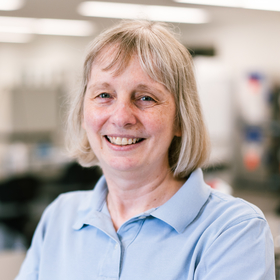

1475 Gortner Avenue
St. Paul, MN 55108
United States
Catherine
Kirkpatrick
Research statement
My teaching focuses on creating research opportunities for students in the context of a Course-based Undergraduate Research Experience (CURE) laboratory course. My research interests relate to best practices and strategies for providing these research opportunities to a large number of students. I want to know what factors contribute most to an engaging research experience where students develop a variety of scientific skills in a challenging yet supportive environment. I am also interested in the impacts of course-based research experiences on the students themselves.
Selected publications
Olson, A.N., Cotner, S., Kirkpatrick C., Thompson, S. and Hebert, S. (2022) “Real-time text message surveys reveal student perceptions of personnel resources throughout a course-based research experience” PLoS ONE 17(2): e0264188.
Thompson, S.K., Kirkpatrick, C., Kramer, M. and Cotner, S. (2020) “Leveraging public data to offer online inquiry opportunities” Ecol. & Evol. 10: 12555-12560.
Kirkpatrick, C., Schuchardt, A., Baltz, D., Wright, R. and Cotner, S (2019) “Computer-based and Bench-based Undergraduate Research Experiences Produce Equivalent Attitudinal Outcomes” CBE Life Sci Educ. March 1, 2019 18:ar10 DOI:10.1187/cbe.18-07-0112.
Ren Y., C. Kirkpatrick, J.M. Rawson, M. Sun, S.B. Selleck (2009) “Cell-type specific requirements for heparan sulfate biosynthesis at the Drosophila NMJ: effects on synapse function, membrane trafficking and mitochondrial localization” J. Neurosci. 29: 8539-8550
Williams B, G. Leung, H. Maiato, A. Wong, Z. Li, E.V. Williams, C. Kirkpatrick, C.F. Aquadro, C.L. Rieder, M.L. Goldberg (2007) “Mitch, a rapidly evolving component of the Ndc80 kinetochore complex required for correct chromosome segregation in Drosophila” J. Cell Sci. 120: 3522-3533
Kirkpatrick, C.A. and S.B. Selleck (2007) “Heparan sulfate proteoglycans at a glance” J. Cell Sci.: 120: 1829-1832 (invited review)
*Kirkpatrick, C.A., *S.M. Knox, W.D. Staatz, B. Fox, D.M. Lercher and S.B. Selleck (2006) “The function of a Drosophila glypican does not depend entirely on heparan sulfate modification” Dev. Biol. 300: 570-582. (*contributed equally)
Kirkpatrick, C.A., B.D. Dimitroff, J.M. Rawson and S.B. Selleck (2004) “Spatial regulation of Wingless morphogen distribution and signaling by Dally-like protein” Dev. Cell 7: 513-23.
*Simcha, I., *C. Kirkpatrick, E. Sadot, M. Shtutman, G. Polevoy, B. Geiger, M. Peifer and A. Ben-Ze’ev (2001) “Cadherin sequences that inhibit ß-catenin signaling: a study in yeast and mammalian cells” Mol. Biol. Cell 12: 1177-1188. (*contributed equally)
Education and background
Degrees earned
- PhD in Biology, Massachusetts Institute of Technology, 1994: Analysis of the Yeast Transcriptional Regulator LEU3; Paul Schimmel, advisor
- BSc in Biochemistry, University of Toronto, 1987